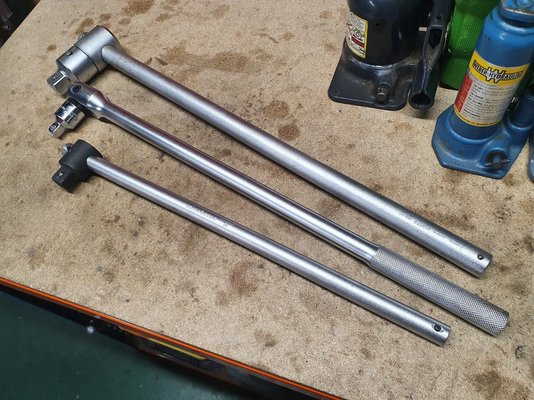My Old Landy
Engineering Mayhem
- Messages
- 3,485
- Location
- North Lincs
My 350Nm torque wrench is 1/2" drive so I don't think that is correct.Mostly, over 200Nm calls for the 3/4” socket set, but I don’t think mine start until 22mm?
My 350Nm torque wrench is 1/2" drive so I don't think that is correct.Mostly, over 200Nm calls for the 3/4” socket set, but I don’t think mine start until 22mm?
Yes I have a 330Nm 1/2 torque wrenchMy 350Nm torque wrench is 1/2" drive so I don't think that is correct.
Not with a rattle gun, I hope.Tightened to 200 would likely require a good excess, over that torque, to free it off. Mostly, over 200Nm calls for the 3/4” socket set, but I don’t think mine start until 22mm?
I don't like to use extensions (between socket and wrench) at the top end of the torque range, either - and never use pipe extensions on breaker bars. Getting a bigger breaker bar is the answer to that problem.
You have obviously never had to undo any trailer wheel nuts that haven't been moved in 30 years then. I have a 5ft 1" drive breaker bar and sometimes have a 8ft pipe over it.- and never use pipe extensions on breaker bars. Getting a bigger breaker bar is the answer to that problem.
I was brave ( or stupid ) and tried it ..got a spreader bar for horse drawn implements .. Being even brave I put in " jointed nut spinner bar " & got a sort of swingle .If you google searched a "swingle" it would probably throw up a sexual deviant, breaker bar would get you what you want
Bob

Which also sounds like a deviant device on certain websitesIve just done a deal on a strap on torque multiplier

That’ll be sore in the morningIve just done a deal on a strap on torque multiplier
I understand not using lube.Big difference between torque required for a dry nut and for one soaked in lube. Big issue in the Aero industry.
If you google searched a "swingle" it would probably throw up a sexual deviant, breaker bar would get you what you want
Bob

It keeps manufacturers busy making new 1/2" breaker bars

You have given the solution in your post , a deformed or worn thread is the case for changing both the stud and the correct matching wheel nut .I understand not using lube.
On the other hand, if the threads are rough,or tight, or a bit damaged, a lot of the torque figure which you set on your torque wrench will be overcoming friction on the threads, not clamping the wheel on the hub.
A torque wrench, I believe, will only work properly if you can easily screw the stud or nut home with fingers only. Otherwise the fastener will be under-torqued.
who on earth changes a stud unless its actually knackered though?You have given the solution in your post , a deformed or worn thread is the case for changing both the stud and the correct matching wheel nut .

How do you know that Copper grease results in exactly 20% extra fastener tension? Surely that is just a wild guess?who on earth changes a stud unless its actually knackered though?
There are two reasons why wheel studs are damaged in the first place - 1. too much friction or corrosion causing galling; and 2. rough-ass tightening with too many ugga duggas.
This is why I always use copperease and torque to the manufacturers minimum torque. Will never damage anything, as that extra 20% fastener tension is well within the safety margin by design.
We've had this argument before several times on here, and each time there are people adamantly opposed to lubing wheel bolts - I understand the theories and there are pros and cons both ways. Ultimately I go with lube.
who on earth changes a stud unless its actually knackered though?
There are two reasons why wheel studs are damaged in the first place - 1. too much friction or corrosion causing galling; and 2. rough-ass tightening with too many ugga duggas.
This is why I always use copperease and torque to the manufacturers minimum torque. Will never damage anything, as that extra 20% fastener tension is well within the safety margin by design.
We've had this argument before several times on here, and each time there are people adamantly opposed to lubing wheel bolts - I understand the theories and there are pros and cons both ways. Ultimately I go with lube

